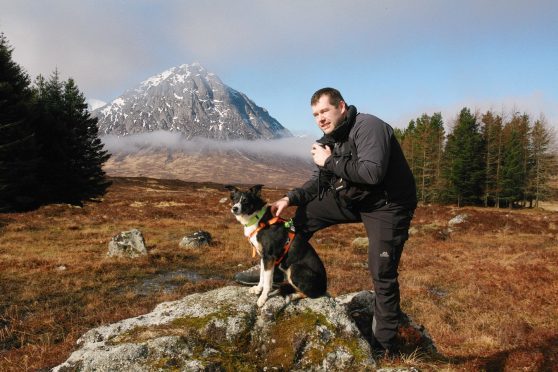They usually plough a lone furrow on Scotland’s hills, searching for missing climbers and walkers.
But this weekend, Scotland’s Search and Rescue Dog Association (SARDA) members are having a bit of a get-together.
More than 20 of these very special canines and their handlers from across Scotland are being put through their paces at a training and assessment course in Glencoe this weekend.
SARDA Scotland dogs have recently been involved in many searches, including the search for missing climbers Rachel Slater, 24, and Tim Newton, 27, who were reported missing on Ben Nevis on February 15, and the ongoing search in the Cairngorms for James Robertson, 61, who was last seen on February 29.
The association’s secretary Ken Weatherstone said: “All our handlers are volunteers who are willing to assist mountain rescue teams throughout Scotland, on call 24 hours a day.
“They all do a great job, but our real heroes are our dogs.”
He added that last year the association’s mountain rescue search dogs helped to save lives by assisting mountain rescue teams and police in more than 70 searches throughout the country.
One of the founders of the association, Dr Catherine MacLeod, 83, who has homes at Kinlochleven in Lochaber and Portknockie in Moray, was invited along for the first day of the course yesterday (Friday).
Dr MacLeod and her then husband Hamish MacInnes were instrumental in setting up SARDA in 1965.
The couple started by training their own dogs, Tiki and Rangi, and the association has grown from there.
She said: “I get a lot of satisfaction from the fact it has continued and that the work we put into it has paid such dividends.
“Quite a lot of people owe their lives to this and I think it is something to be proud of.”
She added that dogs can search a large area much more quickly than people without dogs, with a dog being equivalent to about 20 people for moorland searches.
SARDA dog handler Stuart McIntyre, 39, from Burghead, Moray, who works with his eight-year-old short-haired collie Nell, was already a member of the RAF search and rescue team when he decided he wanted to train his own dog.
He said: “Having worked with SARDA dogs and seen them in action, I understood just how valuable the dogs were and the amount of ground they could cover.
“The dogs qualify as a novice at around 12 to 18 months and a fully qualified dog about a year later.
“Novices go on call outs, but search coordinators will try to match them with a fully qualified dog whenever possible.”
He explained that they train the dogs with squeaky toys, which they learn to associate with looking for a person.
They are also taught to signal when they have found the casualty and always get a game with their toy at the end of the search to reward them for their work.
